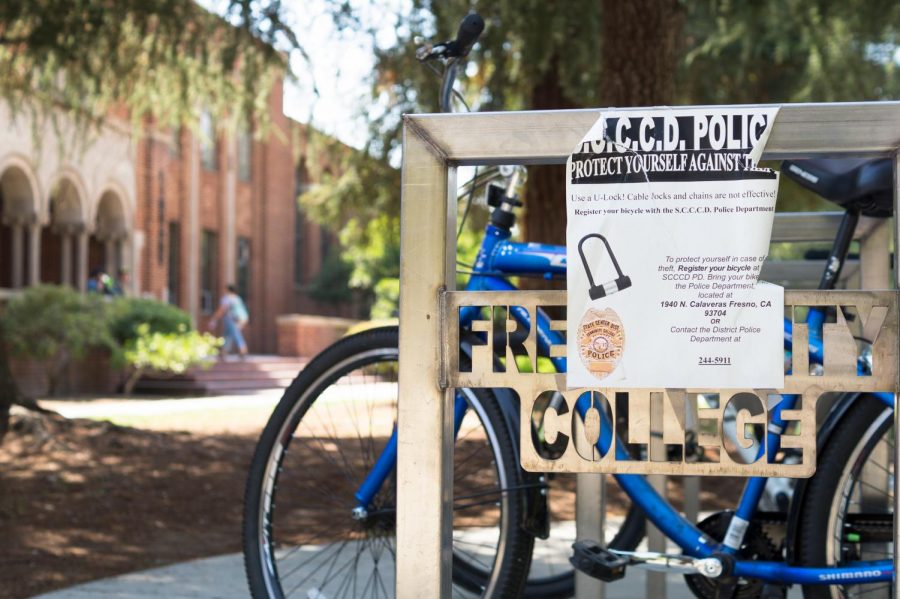Taking Preventative Measures Can Curb Theft on Campus
Photo by: Rampage File Photo
An SCCCD police flier reminds students to use U-locks to prevent bike theft.
November 8, 2017
Fresno City College has experienced a number of thefts over the fall semester, including stolen bicycles, backpacks, cellphones and even textbooks.
During the month of October, there were four reports of grand theft, four reports of petty theft, two reports of burglary, and one report of theft of personal property on campus, according to the SCCCD police daily call log.
The number of incidents has decreased compared to previous years, but students may still be vulnerable if they fail to take precautions.
SCCCD Police Chief Jose Flores said theft is often preventable when students and faculty do their part to protect their own and others’ belongings.
He also said that the the best chance police have of catching a thief and recovering property is if the incident is reported immediately or as it is in progress. The likelihood of recovering property is greatly reduced the longer an incident is not reported.
Flores urges students to report any individual or activity that seems suspicious or out of the ordinary, stating that many of the thefts are perpetrated by individuals who are not staff or students, since the location and openness of the campus make it possible for anyone to enter.
“The beauty of an institution of higher learning is that it’s supposed to be an open space, so the students can enjoy that environment,” Flores said. “They take advantage of that. We don’t want to build prisons for the students, we don’t want walls… that’s why the student community and the faculty and staff need to do its part to combat these people.”
Flores insists that it is better to report a situation even if students are unsure if an individual belongs on campus or not, and allow the campus police to determine the intent and validity of the individual’s presence.
“They try to blend in and commit these crimes… they look like students, it’s hard to determine whether they belong on campus or not,” Flores said. “Don’t be a hero, we’re not asking students to confront these people… discretely walk away and call us.”
One of the most common targets of theft on campus is bicycles, which can be prevented by the use of proper bike locks. According to campus police, U-shaped locks are more effective and more difficult to cut through than chain and cable locks.
Flores explained how “prevention is the best strategy,” and the prevention of many thefts is possible by students being proactive and responsible with their belongings. Students can safeguard their possessions by not leaving belongings unattended, making sure valuable left in vehicles are out of sight or in the trunk, and remembering to always lock their vehicles.
As it gets colder, Flores says students will bring coats to class, and may remove them as the day warms up. Coats have also been a common target in previous years, and depositing one’s coat and other garments in one’s trunk as opposed to on one’s car seat is a much safer alternative.
Due to the campus’ lack of public lockers, Flores suggests students know their schedule, and plan accordingly, bringing only the books they need that day, and leaving valuables like laptops at home unless absolutely necessary.
Many of the incidents are reported as petty theft, which includes any theft of property valued at $950 or less. Flores asserts that a factor contributing to the prevalence of these crimes is Proposition 47, which passed in 2014.
The proposition reduces non-violent offenses such as theft that does not exceed $950 from a felony charge to a misdemeanor.
Flores believes the proposition all but eliminates the deterrent of these crimes by greatly reducing their consequences and repercussions, leading to repeat offenders.
According to an article in the San Francisco Chronicle in 2016, 49 cities in California experienced an increase in crime rates in the year following the proposition passing, based on a 2015 FBI report.
However, on the FCC campus Flores says it is a communal effort to be proactive and vigilant, and the student population owes it to themselves and each other to look out for one another’s well-being and personal property.
This includes turning in lost property to the SCCCD Police Department so those items can be returned to their rightful owner. Flores explained there is “no such thing as ‘finder’s keeper’s’”, and if someone neglects to turn in lost property, that too constitutes theft.
“Care about your fellow students, your faculty members,” Flores said. “We have to develop this virtual wall that lets them know we’re not going to take it, that we’re going to catch them, and law enforcement can’t do it alone— it’s going to take the whole campus community.”

